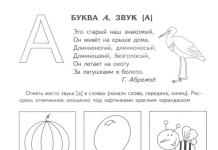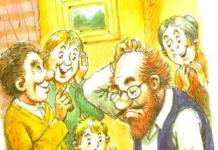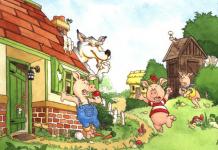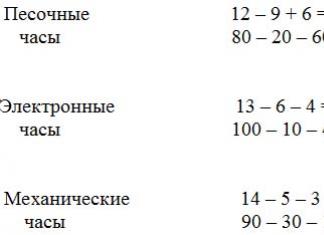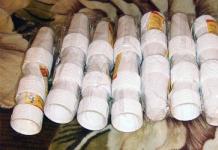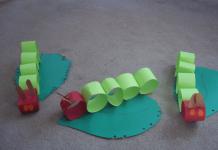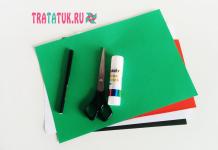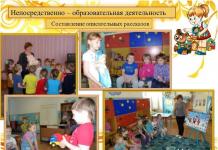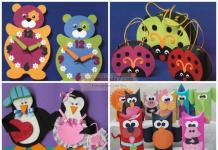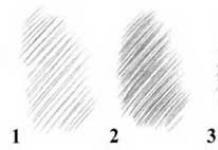Today's comic duties of a teacher are the eternal dreams and naive desires of schoolchildren that will never come true. But nobody forbade dreaming - that's why children dream!
I fantasized about this topic, and something like that happened. Dear teachers, treat with humor - you yourself dreamed of something like this at least once in your childhood))
These duties of a teacher can be used at any creative school event, especially on Teacher's Day and on Self-Government Day - by the way, when is it held? Or is it different for everyone? It is still possible on April 1.
How to formalize the duties of a teacher:
In the form of a comic order for the school;
As a note of protest - a joke, of course;
In the form of an ancient scroll found during excavations (here, they say, even in prehistoric times, schoolchildren dreamed of the same thing! And it doesn't matter that maybe there were no schools at all then);
Well, now directly yourself
Joking duties of a teacher
through the eyes of students.
The teacher is obliged:
1. Tell a student who is late for class:
From 1 to 15 minutes: - Come in, please, sit down, we didn't start without you!
From 15 to 30 minutes: - My friend, half a lesson has already passed, why should you sit here in vain? Better go to the dining room, eat a pie with compote!
2. If the teacher is late for the lesson, the next day he can come to school only with his parents.

3. The teacher is obliged to switch off his mobile phone while still in the corridor and put it in his pocket or bag. If the teacher's phone rings at least once during the lesson, the students will complain to the principal.
4. If during the lesson the teacher is noticed reading a book, it will be taken away and given away at the end of the school year. In case of repeated violation, the book will be immediately donated to the library.
5. The teacher is obliged to wear a school uniform, not to put on jewelry and not to use cosmetics - you came after all!
6. The teacher is obliged to completely exclude from his speech phrases that traumatize the fragile psyche of students, namely:
Diary on the table, immediately!
Tomorrow I will only go to school with my parents!
The answer is not correct!
The rating is unsatisfactory!
7. Other phrases that are hard on the receptive ears of children should be replaced with more sweet phrases. For example, instead of words:
Today we are writing a dictation, tomorrow - a test in mathematics, and on Wednesday you will have a final test on the topic! -
teachers should say:
Who wants to write a dictation today. Others can go home.
Anyone who wishes can stay for the test. I will not delay the rest.
Fans of puzzles, charades and tests can test themselves on Wednesday in the final test on the topic passed. Those who prefer other types of puzzles can be free.

8. All missed lessons, regardless of the reason for the absence, the teacher must complete, otherwise he will not be admitted to the next lessons.
9. To all the parents' questions about their idiot, the teacher is obliged to answer that the boy is talented to genius, and geniuses often remained incomprehensible even to their parents.
10. To your own question, why are there some responsibilities and where are the rights, the answer is:
Dear teacher! You always have one unconditional right - to be your students! Use this right for all 100!
Wishing only pleasant duties,
Your Evelina Shesternenko.
Sections: Working with preschoolers
The development of speech is one of the most important areas of the teacher's work, designed to ensure the timely mental development of the child.
The urgency of this problem is very high. It is focused on the development of thinking, imagination, communication of preschoolers.
It is important to emphasize that it is precisely preschool childhood that is the sensitive period for the acquisition of speech. The modern school requires a high level of speech development from the child. If this level is high, then children read well and write competently, better understand and perceive what is being studied, clearly express their thoughts. For a preschooler, good speech is the key to successful learning and development at school. Children with poorly developed speech lag behind, often find themselves among those who do not succeed in various subjects.
It is important to emphasize that the culture of speech of children is inextricably linked with the culture of speech of the educator and everyone around.
Only the educator who owns his own speech and tirelessly cares about its improvement can fruitfully work on the speech of children. The teacher's speech should be characterized by absolute literacy, clarity, expressiveness, accuracy and correctness of verbal designations. (slide 2)
Let's remember again, what sections does the speech consist of?
Dictionary
Gramstroy speech
Syllabic structure of the word
Coherent speech (slide 3)
Today we will hold a quiz on the topic “Nice speech is pleasant to listen to”. You will have a great opportunity to show in the competition your creativity, theoretical and practical knowledge, objectively assess the knowledge of your colleagues on this topic.
(Divide into teams. Come up with a team name. Choose a jury)
1 task - “Question-answer” warm-up (slide 4)
2 task "The Merry Poet" (slide 5)
What are pure clauses?
Pure speech is a set of words and phrases designed to train speech pronunciation skills.
Your task is to come up with phrases
(for example: ta-ta-ta - we saw a cat; we will give tu-tu-tu-milk to the cat; as-as as - the light went out, etc.)
3 task "Find the words"
Figurative speech is an integral part of the culture of speech. The formation of figurative speech is of great importance for the development of coherent speech, which is the basis for the upbringing and teaching of children.
The Russian language is very rich and imaginative. This or that feeling, experience, phenomenon, event can be expressed in a huge number of words.
The more a child hears beautiful, expressive words in ordinary colloquial speech of adults (educators), the more he absorbs the harmony of the word.
Come up with as many definition words as possible about AUTUMN. Autumn WHAT? (slide 6)
(golden, early, late, damp, rainy, gloomy, sunny, warm, dry, deciduous, etc.)
(In turn, each member of each team says 1 word. Do not repeat!)
ACTION WORDS: What DOES the autumn leaf DO? (slide 7)
(turns yellow, turns red, dries, falls, flies, falls, turns, swirls, floats (in a puddle), rustles, curls, etc.)
What can you DO with an autumn leaf? (slide 8)
(tear, throw, crush, crumble, sniff, iron, touch, dry, etc.)
4 task "Find a pair" (slide 9)
The Russian language is very rich in its words and expressions. Very often the same meaning can be expressed in different ways. In this, the expressive means of language - phraseological units often come to our aid.
What are phraseological units?
Phraseologism is not a very large phrase, as a rule, it has a figurative meaning, although it may well express the usual meaning.
Give examples of phraseological units (“that's where the dog is buried”, “lead by the nose”, “fly in the clouds”)
In the very meaning of phraseological turns, the prerequisites of imagery and emotionality are laid. They give the statement a unique originality, special individuality and can be used to develop the figurative speech of preschoolers.
Phraseological turns of phrase - synonyms and antonyms - help in the development of attention, teach to compare and draw conclusions.
Your task is to find a pair.
- 1 team - opposite in meaning, antonyms
- 2 team - similar in meaning, synonyms and explain the meaning of the underlined phraseological units.
Phraseologisms - antonyms
Phraseologisms - synonyms
5 task "Patter" (slide 10)
What is a tongue twister?
A tongue twister is content-naive, uncomplicated, even primitive text, which is built on intricate and difficult word-combinations and word-combinations. Rather, they can be called difficult slips.
Can tongue twisters be used in working with preschoolers?
Sure. It is only important to select them correctly for each age group. (For example: in the middle group we select tongue twisters with consonants of early genesis: [n, t, k, m, n], etc. In the older one we work out whistling and hissing sounds, and in preparatory is the differentiation of sounds [l - l] [l-r] [s - w], etc.)
Choose from several 1 tongue twister for learning
The tongue twister tells about some, maybe not significant, event. It has a thought that is expressed in words. And the word must be effective.
You need to pronounce a tongue twister with different intonation, conveying a different attitude to what happened.
Statement of fact
Regret
Joy
Astonishment.
Different logical meaning
Thus, you have seen how you can work on intonational expressiveness using tongue twisters
6 task - "Long story" (slide 11)
The development of coherent speech in children is one of the main tasks of preschool teachers. The “Kindergarten Education Program” provides for a system of special lessons for teaching children to tell stories. An indicator of the lack of formation of coherent speech in older preschool children is a violation of the coherence and consistency of presentation, semantic gaps, situationality and fragmentation, a low level of phrasal speech used. In the work on the development of coherent speech in older preschoolers, it is necessary to strictly observe the gradual transition from statements based on clarity to statements of their own design. When planning classes, the algorithm for complicating speech activity by types of narration is observed:
- retelling;
- drawing up a descriptive story;
- drawing up a story based on a series of plot pictures;
- composing stories based on a plot picture;
- creative storytelling.
Mastering each type of storytelling goes gradually, in a certain sequence and is carried out based on the previous type of storytelling.
We offer you a game "Long story".
An equal number of subject cards are distributed to each team. The first player lays out on the table and comes up with sentences in which the object depicted on the card is mentioned, the second player lays out his card and also draws up a sentence so that it forms a coherent story with the previous one, etc. The team whose story turned out to be plot and interesting wins.
So, our quiz has come to an end. You showed your creativity and theoretical knowledge today. And we showed how, using different techniques, you can easily and simply develop all the components of speech, which are the basis of communication.
While the JURY is SUMMING UP, we invite you to guess the modern meaning of Old Church Slavonic words:
Round (slide 12):
Pimply;
Curly (correct answer);
Freckled.
Get away (slide 13):
Get dirty (correct answer);
Wrap yourself up;
Get lost.
Dumbfounded (slide 14):
Be angry;
To be stubborn;
Get lost (correct answer).
Meet (slide 15):
Fall in love;
Recover (correct answer);
Shake it up.
Eldaichki (slide 16):
Wheat cakes (correct answer)
Vintage women's jewelry;
The jury announces the winners of the quiz.
In conclusion, as always, reflection. Continue the phrase (draw out the beginning of the phrase that needs to be continued on the sheets of paper)
- I like it...
- It was especially interesting ...
- I enjoyed ...
- It was difficult for me ...
- It was not entirely clear ...
- I'll take it to work ...
- I understood today ...
- I'll use the trick ...
- Today it annoyed me ....
- I received information ...
Bibliography.
1. Arushanova A.G. "Speech and verbal communication of children 3-7 years old"
2. Alyabyeva E.A. "Development of imagination and speech of children 4-7 years old"
3. Grizik I. V. "Teaching children to describe objects"
4. Konina M.M. "The role of pictures in teaching the mother tongue of older preschool children"
5. Korotkova E.P. "Conversation as a means of developing speech in preschool children"
6. Maksakov A.I., Tumakova G.A. “Learn by playing”
7. Ushakova O.S. "Teaching older preschoolers to tell story based on a series of plot pictures"
8. Ushakova O.S. "Methodology for the development of speech in preschool children"
9. Shvaiko G.S. "Games and game exercises for the development of speech"
Quiz "Dressing Questions"
- Once upon a time in Russia, such products were simply called "trousers". In the modern world there are many of their varieties: bell bottoms, capri pants, bananas, bermuda shorts, pipes, breeches, leggings ... (Pants, pants.)
- An intelligent man, as a rule, has several options for this accessory in his wardrobe. And in the film "Love and Doves" because of him, the main character even quarreled a little with his wife. (Tie.)
- This garment can be single-breasted or double-breasted. As a rule, it serves as the top of a classic suit. (Blazer.)
- This item evolved from a loincloth that covers the lower body. There are mini and maxi. (Skirt.)
- Outerwear, usually below the knee. It happens in winter, summer, demi-season. Fashionistas wear with a fur collar. (Coat.)
- The moth spoils this expensive thing with impunity from May to September, but does not touch it while it is being worn by a person. (Fur coat.)
- Lightweight clothing that covers the upper body. Its "predecessors" were the ancient Greek tunic and the Roman tunic. Willingness to give the "last" was considered the height of kindness and selflessness. (Shirt.)
- This is perhaps the most important wardrobe attribute that deserves special attention. Worn in pairs, usually made from cotton, wool, nylon or synthetic fabrics. The best color is black. (Socks.)
- The prototype of this garment appeared in Ancient Greece: two pieces of fabric were fastened with pins at the shoulders and a belt at the waist. This garment became famous for Coco Chanel, creating a little black novelty in 1926. (The dress.)
- A winter garment for the hands that has two compartments, one for the thumb and the other for everyone else. (Mitten.)
- A narrow scarf worn under a coat. (Kashne.)
- A piece of knitted clothing for the upper body, without fasteners, with long sleeves. Modern industry (especially in China) produces many cheap, short-lived and cold items from artificial yarns. However, these products serve without loss of quality and presentation for up to 10 years. (Sweater.)
Football quiz for women
Host: Nowadays, the most popular sport is football. Lovely women, let's surprise men with the knowledge of this man's game. And if you cannot answer, then we will ask men to help.
- The "Black Pearl" of football, he is the best officially recognized footballer of the century. (Pele.)
- How many people should be on the field from each team? (11)
- A structure with two rods and a crossbar at the end of the field where the players are trying to shoot the ball. (Gates.)
- What word can you call a goalkeeper? (Goalkeeper.)
- Side goal post. (Barbell.)
- Breaking the rules. (Foul.)
- A famous player who is considered the second most important footballer in Brazil after Pele. (Ronaldo.)
- Find a Russian synonym for forward. (Attack.)
- The 45 minute portion of a soccer match. (Half.)
- National Hero of Argentina, his nickname is "San Diego", that is, Saint Diego. (Diego Maradona.)
- What is a referee? (Football referee, referee in the field.)
- What is the name of the upper goal post? (Crossbar.)
- A competition of two football teams during the time allotted by the rules, consisting of two halves. (Match.)
- Who is the scorer? (Player who scores many goals.)
- Name a Soviet footballer who has been awarded the title of "Best Goalkeeper of the 20th Century". (Lev Yashin.)
Cosmetic quiz for men
Host: It has long been known that a man loves with his eyes. Therefore, many tricks were invented by the weaker sex to make themselves even more attractive. Dear men, let's surprise charming ladies with your knowledge in the field of beauty. And if suddenly you do not know something, then women, of course, will prompt you.
- A duty tool that guards the beauty of eyebrows. (Tweezers.)
- Decorative cosmetics designed to emphasize, highlight the color of the eyelashes. (Mascara.)
- Cosmetic product for coloring and moisturizing lips. (Lipstick.)
- Detail of the shoe that raises the heel above the toe level, making a woman's gait look more graceful and feminine. Appeared in women's fashion thanks to the legendary Marquise Pompadour. (Heel.)
- A product that decorates a lady's handle. (A bracelet.)
- Women's things from the category of "beauty for the eyes." (Eyeshadow.)
- A small envelope bag that has no handles or a strap - it is worn clasped in the palm of the hand or under the arm. (Clutch.)
- A small but very useful tool that is used to alert nails. (File.)
- This item is in every women's handbag, it is an indispensable tool for maintaining makeup throughout the day. He will tell the whole truth, or rather, show. (Mirror.)
- An item of clothing that elegantly accentuates a woman's waist. (Belt.)
- A cosmetic cream containing solid particles. Designed to cleanse the skin from dead cells. (Scrub.)
- A cosmetic procedure for the treatment of nails on the fingers and the fingers themselves. (Manicure.)
- A pair of ear ornaments. (Earrings.)
- Spray used to create and maintain hairstyles for a long time. (Hair fixation spray.)
Game "Story by numbers"
Those who wish are invited, 3-5 people. The presenter announces that everyone can write letters and numbers with their hands, but with the help of ... hmm, it is more difficult to do this with the waist. The participants in the game stand with their backs to the guests and carry out a small warm-up: draw the numbers 1, 2, 3, 4, 5 with the movements of the waist.
Then the facilitator asks that when reading the story, participants draw a number with their waist as soon as they hear it.
“On Sunday, the teacher woke up as usual at 7 (seven) in the morning. Stretching sweetly, I decided to take a nap until 8 (eight). Suddenly 3 (three) rings rang out. It was the 1st (first) congratulatory call. Then the teacher remembered that today is his birthday, smiled 5 (five) times and answered the interlocutor 4 (four) times: “Yes,” and then nodded 9 (nine) more times.
The teacher's wife woke up from intense nods and presented the birthday boy with gifts: 2 (two) packages and 3 (three) bags with something pleasant and necessary. She looked affectionately at her husband and kissed him on the cheek 5 (five) times. And then came 2 (second), 3 (third), 4 (fourth). 5 (fifth), 6 (sixth) and 7 (seventh) calls. The birthday boy accepted congratulations with pleasure, but he didn't want to doze. "
After reading the text, the presenter reports that it was actually a test for grace. The most graceful guest is chosen according to the volume of the applause.
Tolerant game "I greet you"
There is always a difficulty in bringing the different people around the table together. There is a wonderful opportunity to do this effortlessly, naturally and naturally.
Depending on the number of guests, cards are distributed with information about how people greet in different countries of the world. One card can be issued for 2-3 persons. One of the group members reads the card, then the group shows a greeting. After that, all guests sitting at the table should also greet the neighbor on the left and right.
Cards:
1. Poles, greeting the lady, say: "I kiss the hands!". And they themselves only pretend to kiss.
2. Tajiks fold both hands just below the chest and, bending over slightly, approach their friend. With the words "Assolom aleikum" they held out both hands to him.
3. Tibetans, when greeting, take off their headdress with their right hand, and put their left hand behind the ear, and even stick out their tongue.
4. Turkmens put their hands in long sleeves and kiss each other on the cheek.
5. The Persians wish: "Be cheerful!" Good wish, if you think about it.
6. Jews, greeting, say: "Peace be with you!"
7. The Zulus exclaim with admiration: "I see you!"
8. The Egyptians ask carefully, "Do you sweat well?"
9. In Malaysia, they simply ask: "Where are you going?"
10. Indians fold their palms in a boat and bow their heads respectfully.
11. The Chinese bow with their arms extended along the body, while still shaking hands with themselves.
12. Laplanders rub their noses against each other. Perhaps they are at the same time warming up in this way.
13. Latin Americans happily hug at the meeting.
14. The Japanese are very attentive to the greetings. They use three types of bows - saikeirei (the lowest, for the most respected people), medium (at a 30-degree angle) and light (at a 15-degree angle), for barely familiar people.
15. Greenlanders always exclaim: "Good weather", even if it is raining and snowing outside and squally winds.
16. Residents of India, instead of wishing good morning, ask the burning question: "Did the mosquitoes bother you too much tonight?"
17. In New Guinea, it is customary to say hello without words, simply by raising your eyebrows.
The presentation was made on the basis of a quiz, the author of which is Ageeva Inessa Dmitrievna, the creator of the site "Methodological piggy bank of a teacher, educator, parent".
The presentation (changing the background and design) can be used as an element of a diverse event of the teaching staff.
Download:
Preview:
To use the preview of presentations, create yourself a Google account (account) and log into it: https://accounts.google.com
Slide captions:
QUIZ FOR PRESENT AND FUTURE TEACHERS The presentation was made by Vera Alekseevna Shumarina on the basis of the quiz Inessa Dmitrievna Ageeva (creator of the site "Methodical piggy bank of a teacher, educator, parent")
Which specialists are always hindered by changes? For teachers
They joke that a representative of this profession has "the best qualities of a trainer, a clown and a circus horse, which is chased in a circle year after year." What profession are we talking about? Teacher.
What professions all the time ask young people questions to which they themselves know the answers? Teachers
Which professionals can motto a line from a song: “For the hundredth time I'll start over again, start over, start everything from scratch…”? Educators who are accepting a new set of students.
Which letter, approaching any very good teacher, influences him very badly? Letter "M": teacher - tormentor.
What is the Italian word for “teacher” that musicians and composers are often called? Maestro.
In ancient Rome - a teacher who taught children the basics of linguistics - grammars. The reading teacher is a writer. The slave who accompanied the children to and from school is a teacher. And what was the name of the teacher of arithmetic in ancient Rome? Calculator.
In a 17th century Russian primer, the engraving depicted a teacher in the classroom at this educational process. How? Flogging.
Name the teacher who dedicated the poem to street children? Makarenko AS, who wrote the "Pedagogical Poem".
In 1762, teacher John Spilsbury pasted a map of England onto cardboard and cut it into pieces. This is how the game appeared, then intended for teaching geography. Name this game that every child is now playing. Puzzles.
The best Russian film actors and directors receive the Nika award, and the TV people receive the Teffi award. What prize do our teachers receive? "Crystal Pelican". The pelican is a symbol of selfless maternal love. It is believed that he tears his own breast to feed the hungry chicks.
What hunters, drummers and math teachers can't do without? No fraction.
A dictator is a teacher ... In what subject? The teacher of the Russian language, because it is he who dictates the dictations.
Why do computer science teachers have chronic runny nose and cough? Because they sit for a long time in front of the open windows of the Windows operating system.
Why do computer science teachers' hands love to lick cats? Because they smell like a mouse.
Everyone has their own skeleton in the closet. What kind of teachers is this saying? About biology teachers.
What was the name of the slave who accompanied the boy to school in Ancient Athens? -Director -Zavuch -Teacher -Dean
The representative of what profession in post-revolutionary Russia was called "shkrab"? a) Polisher; b) Teacher; c) Dishwasher; d) Watchman. Shkrab is short for school worker.
Insert the missing word in Aristotle's aphorism: "Nothing is so firmly remembered by students as ... their teachers." a) outfits; b) lessons; c) errors; d) smiles.
How do Japanese people address their teacher? a) Sensei; b) Samurai; c) Kamikaze; d) Ikebana.
How should the teacher explain the lesson material to the students? - arrogantly - easygoing - seductive - fluent
What is the name of the now popular Russian filmmaker who made the films "Space as a Premonition", "Diary of His Wife", "Walk"? Alexey Uchitel.
Which subject teacher should I refer to "Your Reverend" or "Your Degree"? To the mathematics teacher, because he is an expert in the similarity of triangles and power functions.
Internet resources zanimatika.narod.ru bibnout.ru/?p=5094 editlw.ru / downloads.php? Page_id ... mobilewallpapers.narod.ru / holidays / ... f-slon.ru /? Mode = pages & page = new1 ...
On the subject: methodological developments, presentations and notes
Psychological-theoretical and emotional-psychological readiness of a student for professional and pedagogical activity is an important factor in achieving high-quality training of a future teacher
Annotation. The article describes the characteristics of professional competence as an integral component of the professional position of a future teacher. The conditions necessary for the formation of ...
International scientific and practical conference (2012). Form of participation: correspondence. Topic of the report: "Formation of professional competencies of future teachers by means of subject training and professional ...
Being a teacher is one of the noblest professions. To learn more about the people of this profession, we have prepared questions for teachers on Teacher's Day. Many of the questions are quite difficult, even tricky, with a trick, while others are comic, funny. They are great for school interviews with teachers.
Check out this list to find the questions you can ask your teacher. You will love the way your school teachers answer school questions.
Questions for teachers on teacher's day
- Is it true that today children have disaccustomed to writing correctly?
- What are teachers really doing in the staff room?
- How do you deal with your dislikes and likes in class?
- How should a young teacher behave if a student / high school student confesses his love to him?
- What would you like to change in teaching methods or school approach?
- Is it easy to be a teacher, what difficulties of this profession are the most difficult to bear?
- What prompted you to become a teacher?
- What do you like most about schooling and what do you hate the most?
- If you had to choose a new profession again, would you agree to become a teacher?
- Did you have a moment when you wanted to quit your job?
- What's the stupidest or weirdest question a student / student has asked you?
- What's the worst in the current education system?
- What historical character would be the most boring to meet in real life?
- When did you get the idea to become a teacher?
- Who of the teachers influenced your whole future life?
- What are the key factors (traits) that have helped you become a good teacher?
- What is the most important piece of advice you want to give to the parents of an elementary school child?
- What do you know about your students?
- If you had the opportunity to get something from the Minister of Education, what would it be?
- Do teachers have other holidays besides school holidays?
- What is the most aggressive age of students?
- If you had to become a student of our school, who would be your favorite teacher?
- Is there something you would like to teach your students that you cannot do?
- What is the most curious, shameful thing that happened to you during the lessons?
- Do you think your profession influences the upbringing of your own children?
- What is the most difficult part of the teaching profession?
- What was the worst thing about working with the parents of the students?
- What are the signs that students are manipulating you?
- What educational mistake you made the most that you regretted?
- Do you have school favorites?
- For the sake of revenge, can you underestimate the student's grade on exams?
- Who is the most popular hero of our school?
Funny questions for teachers for teachers day
- If the ham is made from pigs and beef is made from cows, then what animal is the bread made from?
- Why don't people on the other side of the earth fall?
- A girl in a physics lesson: “If there is the speed of light, then what is the speed of darkness?
- Why do meteorites always land in craters?
- Is the African sun the same as in Russia? Then why is it warmer there?
- If Russian is the language of Pushkin, then what language are our surnames?
- If, according to the teacher, mathematics is so simple, then why does a mathematician have so many problems with his students?
- How do you punish your family members (children, marriage partner) when they misbehave? Putting them out the door, giving them a bad grade, or challenging your parents for a conversation?
- When you come home, do your children get up and say "Good evening, teacher"?
- If I have problems, can I use the Pythagorean theorem to solve them?
- Chewing on your pens or pencils?
- Which super hero is most like you?
- What do you drink at dinner?
- Why do teachers ask students questions (why, why, how much), they themselves do not know the answer?
- Can you roll your tongue out of pleasure?
- Why doesn't heaven fall on us?
Funny questions for teachers
- The farmer has 17 sheep. All but nine die. How many sheep does he have left? (Answer: 9 sheep).
- Ten candles are burning in the dining room. Three of them blew out with a draft. How many candles are left by morning? (Answer: three candles, since the seven remaining candles will completely melt, and the only whole candles will remain three extinguished by a draft).
- What word in Russian is always spelled incorrectly? (Word: wrong).
- How is it correct to say: "The egg yolk is white" or "the egg has a white yolk?" (Answer: Both options are incorrect, as the egg yolks are yellow.)
- A man stands on one side of the river, his dog on the other. He calls out to the dog, which crossed the river so quickly that it didn't even get wet. At the same time, the dog did not run across the bridge and was not in the boat. The question is, how did the dog cross the river? (Answer: on ice, since the river was frozen).
- If you give me food, I will live, and if you give me water, I will die. Who am I? (Fire).
- Your parents have six sons, including you, and each son has one sister. How many people does your family have? (Answer: 9 people: both parents, six sons and one daughter, who is a sister for all boys).
- What is black when purchased, red when used, and white after use? (Charcoal).
- I have no eyes, no legs, no ears, but at the same time I move the earth, who am I? (Earthworm).
Tricky Questions for Teachers
Would you like to interview a teacher but don't want to ask the standard routine questions? Then these trick questions to the teacher might work just fine for you.

- What does the perfect teachers day party look like?
- What subject did you get the most A's in during your high school or college studies?
- Is the change for the teacher or the student?
- What excuses did you give when you were late for class?
- Have you had to cheat at school, use cheat sheets in exams?
- The teacher sets an example for the students, if he is late for lessons, then it is possible for the students?
- If a student does not read books, can he become president?
- What's your favorite school cafeteria meal?
- Do you want to teach in school until you are 100?
- What was the worst lesson for you?
- Have you ever wanted to hit a student? What was it because of?
- Have you ever fallen in love with students?
- Do teachers take drugs for complacency?
- Does the teacher learn from his students? What have you learned?
- Would you yourself agree to take the USE or final exams?
- Did you know that in Japan, teachers don't need to honor the emperor? But we are not in Japan is this good or bad?
- Is it true that the only way to be successful in life is to be a nerd?
- As a student, have you ever disliked one of your teachers? Why?
- If you are smarter than me, will that make me wiser than you?
- You are very worried about our exam grades, but what were your exam grades?
- What were your first days at university: did you completely take up your time studying, were you bored or wanted to skip classes?
- What funny, funny nicknames did you give teachers when you were a student?
- Did you make fun of or troll the teachers?
- In class, which teacher from your school would you like to be a student? Why?
- What would you like to change in your behavior, returning again to the school desk?
- Why are subjects taught today that are simply useless in life?
- Why should students compromise their health by doing a lot of homework instead of getting adequate rest?
- Do you always understand students who really feel bad?
Strange questions
- Where is the Great Wall of China?
- Isn't the moon the same sun just off for a day?
- What are pyramidal things in Egypt?
- How do the islands not float away?
- Are there real bears?
- How old was an 18-year-old person on average in 1942?
Teacher interview questions
Like all education interviews, teacher interviews also have specific questions. They are focused on knowledge of work methodology, a sense of vocation, the ability to manage the discipline of students. Here is a list of common questions in this interview format:

- What is your education?
- Why do you want to work in education?
- How do you plan to conduct your courses, classes, lessons?
- How do you feel about school discipline?
- What is your attitude towards modern education?
- What do you think about psychology in education?
- What do you think about pedagogy?
- Do you consider yourself risky?
- Do you consider yourself a positive teacher?
- What will you do if a student, student calls you a bad teacher?
- If you were the headmaster of a school, what goals would you set for the next school year?
- What's the last book you got to read in its entirety?
- How would you motivate students to read?
- In what decade would you like to become a teacher? Why?
- Do you have a loved one who motivates you?
Questions about life outside of school
- What's one of your hidden talents?
- What might the students be surprised to see you outside the school door?
- What is your dream vacation after the school year?
- How do you manage to spend your summer holidays?
- What books would you like to have on a desert island?
- What will be your last lesson?
Questions about school
- What traditions or superstitions do teachers have? Do you adhere to them yourself?
- What school day is considered a good, successful day for a teacher?
- What achievement of the students this year has filled you or filled you with pride?
- How do you manage to maintain self-control and patience? [the question is especially relevant for experienced teachers]
- What inspires you?
- What technologies make learning easier or more difficult?
- What's the best / worst thing about being a teacher?
Questions about students

- What worries you about the behavior of today's students? Why?
- What will help the teacher gain the respect of the students?
- What is the best time for academic performance: morning or lunch?
- What part of your knowledge do you want to pass on to your students?
- How do you feel when a student whispers to a neighbor while ignoring your comments?
- What helps you to be patient in dealing with disciples that even God cannot handle?
- How do you manage to remember the names of all your students, do you have any associations with them?
- Having the opportunity to travel with your class anywhere in the world, where would you like to go?
- Do you keep correspondence with any of your former students in social networks?
- Do you have a personal diary about your pupils, students?
- What song should students listen to when doing homework?
- What is the very first thing that you remember from your work as a teacher?
- Do you think your pupils / students will remember you and the class in which they studied?
Conclusion
Here is a list of questions from which you can choose the appropriate ones to ask the teachers. It is important to remember, however, that an interview is a conversation. So keep it natural and use the questions wisely. Remember to get honest answers to a few interesting questions instead of a dozen lengthy answers to one stupid question?
If you see a catch, use it. It will be interesting and fun. Don't be afraid to drift off the topic a little when the opportunity arises. At the same time, remember that these questions for teachers on Teacher's Day are a great start in order to learn more about their teachers, understand the difficulties, or vice versa, the attractive aspects of this profession.
Regards, Helen.
By the way, look at the questions with the substitution of answers for teachers (shape-shifters).


